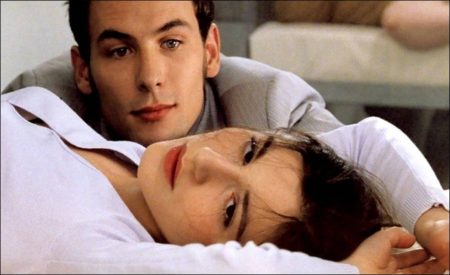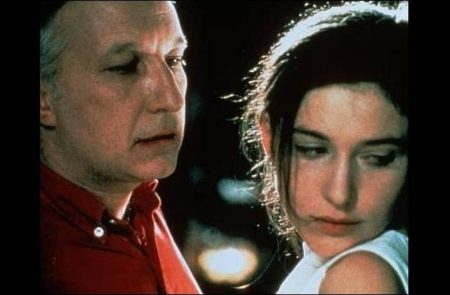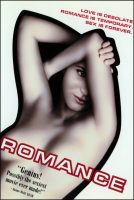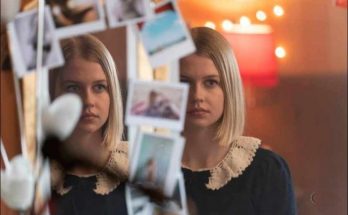Taglines: Love is desolate. Romance is temporary. Sex is forever.
Romance Movie Storyline. A young woman named Marie (Caroline Ducey) lives with her boyfriend, Paul (Stévenin), who refuses to have sex with her. She searches for intimacy beyond the bounds of traditional sexual limitations. She has a sexual relationship with Paolo (Siffredi), whom she meets in a bar. Her frustration also drives her to a series of relationships, until she engages in sadomasochism with an older man.
Romance (Romance X) is a 1999 French arthouse film written and directed by Catherine Breillat. It stars Caroline Ducey, Rocco Siffredi, Sagamore Stévenin and François Berléand. The film features explicit copulation scenes, especially one showing Ducey’s coitus with Siffredi. Romance is one of several arthouse films featuring explicit, unsimulated sex, along with The Brown Bunny (2003), 9 Songs (2004) and All About Anna (2005).
In an interview with The Post, Catherine Breillat appeared to confirm the rumors of actual on-set sex. “An actor never pretends,” she said. “At the same time, I’m not perverse. I don’t impose on my actors or actresses any more than is absolutely necessary. But I don’t pretend. I don’t simulate. The deal was, we’d go as far as we had to, as far as the film required.”
In Europe, Romance was shown in mainstream cinemas; in the United States, it was reduced to a mainstream-acceptable R rating, and the European original version is un-rated. In the UK, the BBFC passed the film uncut for cinemas, though home releases suffered a brief cut to an ejaculation shot. In March 2004, the original version was broadcast, late-night on German public television.
In Australia, the original version of Romance was broadcast uncut on the cable television network World Movies.[citation needed] The film was initially refused classification in Australia, before it was awarded an R18+ on appeal.[6] It single-handedly paved the way for actual sex to be accommodated in the R18+ classification in Australia.
In Canada, particularly in Alberta and the Maritimes, the sexuality was seen as gratuitous to the film and it was given an A rating and XXX rating in those regions.[7][8] In June 2008, in the Netherlands, the original version of Romance was broadcast on Dutch public TV by VPRO as one of a series of Erotica art house cinema.[citation needed]
Film Review for Romance
There is a fantasy scene in “Romance” where a woman’s body is divided by a wall. On one side, from the waist down, she is in a brothel. On the other side, from the waist up, in a delivery room. What is the message of the scene? Don’t be too sure you know. I know I don’t. It isn’t some kind of simplistic message linking childbirth with misuse by men. The woman having the fantasy isn’t really against the activities on either side of the wall. Maybe the scene is intended as an illustration of her own confusion about sex.
The woman’s name is Marie (Caroline Ducey). She could be the woman Freud was thinking about when he confessed he could not answer the question, “What do women want?” Marie asks herself the same question. She wants something, all right. She is unhappy with her boyfriend Paul, who refuses to sleep with her, and unhappy, too, with the sexual adventures she has. It’s like there’s a disconnect between her body and her identity. She does things that sometimes make her feel good, but she doesn’t feel good because she has done them.
“Romance,” written and directed by Catherine Breillat, became notorious on the festival circuit this autumn because it is an intelligent, radical film by a woman, and at the same time it contains explicit nudity and, as nearly as we can tell, actual sex. It is not arousing or pornographic, because the sex isn’t presented in an erotic way; it’s more like a documentary of a dogged woman’s forced march toward orgasm, a goal she is not sure she values. Marie narrates the film herself and also seems to be reading pages from her journal; she is baffled by herself, baffled by men, baffled by sex. Even after climax, her hand closes on air.
Of course the film is French. It is said that for the French, wine takes the place of flirting, dining takes the place of seduction, smoking takes the place of foreplay and talking takes the place of sex. “Romance” is so analytical that you sometimes get the feeling Marie is putting herself through her sexual encounters simply to get material for her journal. These poor guys aren’t lovers, they’re case studies.
And yet the film has an icy fascination. Perhaps it is a test of how men and women relate to eroticism on the screen. I know few men who like it much (sure proof it is not pornographic). Women defend it in feminist terms, but you have the strangest feeling they’re not saying what they really think. At a screening at the Toronto Film Festival there was some laughter, almost all female, but I couldn’t tell if it was nervous, or knowing.
Perhaps the sex content gets in the way, causing our old tapes to play. When we see a stud on the screen (like Rocco Siffredi, in real life an Italian porno actor famous for one very good reason), we go into porno mode and expect to see–well, what we usually see. But “Romance” doesn’t have that mode. Marie relates to Paolo (Siffredi’s character) as if he is a laboratory specimen.
So this is the famous white rat she has heard so much about. Can he bring her pleasure? Is it perhaps a matter of physical endowment? And what about Robert (Francois Berleand), who offers to tie her up? He is an ordinary man, not handsome, not exciting, but he has all the necessary equipment and skills, and when he makes his offer, she agrees, as if he is a guide at Disney World suggesting one more ride she should try before leaving the park. Does she like bondage? She goes back for more. Perhaps it is not the sexual side that pleases her, but the fact that when Robert is arranging his ropes and restraints, at least he is thinking about her.
Romancı (1999) Re-Release
Directed by: Catherine Breillat
Starring: Caroline Ducey, Sagamore Stévenin, François Berléand, Rocco Siffredi, Ashley Wanninger, Emma Colberti, Fabien de Jomaron, Carla, Pierre Maufront, Antoine Amador, Emmanuelle N’Guyen
Screenplay by: Catherine Breillat
Production Design by:
Cinematography by: Yorgos Arvanitis
Film Editing by: Agnès Guillemot
Costume Design by:
Set Decoration by:
Art Direction by:
Music by: Raphaël Tidas, DJ Valentin
MPAA Rating: None.
Distributed by: Rézo Films
Release Date: April 17, 1999 (France), February 11, 2022 (United States)
Views: 253





